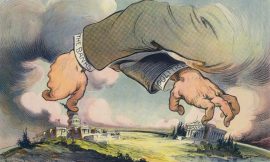Since it was first revealed to the general public, ChatGPT’s prowess has intrigued as much as it has worried. The world of education is one of the first to be targeted. But beyond the risks it implies, this new technological revolution, made possible by artificial intelligence, is an opportunity for higher education. To reinvent itself and keep up with society.
ChatGPT has been heralded in recent weeks in conversations and articles as a new technological revolution. As with every important new development, there are many fantasies that accompany it, fuelled by the ignorance of all of us. ChatGPT, short for Chat Generative Pre-trained Transformer, is a chatbot that can answer many searches by producing a textual response derived from algorithmic processing (commonly called artificial intelligence) of data available on the net. The first demonstrations of this new tool are impressive and suggest a lot of possibilities. Worrying for some, promising for others.
ChatGPT has opened the breach
If there is one thing we can be fairly certain of, it is that this new technology has a future. The startup that developed it, OpenAI, has achieved one of the fastest product launches in history. Introduced in November 2022, ChatGPT already had over 100 million registered users by January 2023. The economic interests in the digital world are therefore already numerous. The tech world and the giants in this field cannot remain outside this new revolution. On 7 February, Microsoft even announced a $10 billion investment in OpenAI, suggesting that its search engine, Bing, will soon be upgraded. At the same time, Alphabet (Google) will soon present alternatives to OpenAI. And the Chinese software giants are also very advanced in image analysis. According to a ranking by Microsoft, the top five computer vision teams are all Chinese.
Read also: Forecasting the present: the role of Google data in assessing real-time economic conditions
However, the future does not belong to the giants alone. Research teams are developing less data-intensive models. As noted in an article in The Economist on 30 January, this disruptive innovation brought about by natural language on computers is the result of fundamental research. And the researchers, regardless of whether they belong to a university or a private laboratory, talk to each other in scientific communities or research conferences and their publications. All are academics of the highest calibre.
A concern which is not artificial
Despite their competence, ChatGPT is generating many concerns in the field of education, and particularly in higher education. Why do teachers in the humanities, management and other fields fear the arrival of ChatGPT? We can, of course, imagine that a student who can simply use ChatGPT to write an assignment will be less tempted to do so by himself… This is a more than valid concern today. Already since the rise of the internet, the risk of plagiarism – thanks to the ease of ‘copy and paste’ – is greatly amplified.
The current responses of higher education to these new risks are first and foremost the training and support of students and teachers in the production of knowledge. In particular, they must know how to cite studied authors according to academic codes that allow the reference article to be identified. In addition, the study regulations of course remind students of the penalties for cheating. There is also the use of anti-plagiarism software which identifies problematic texts. The system is not perfect, but when it is rigorously applied, it reassures professors and institutions about the quality of the work produced by students.
The calculator precedent
But in the face of the unprecedented output enabled by ChatGPT, more needs to be done. Faculty and their institutions must learn to better master the technology to identify the intellectual output produced by the software. We should not fear but try to tame. Prohibiting will not be SKEMA‘s position. Rather, we will invite our faculty and students to learn about the tool and the tools to come. The example of the calculator is often cited, banned in its time during exams. Who questions its use today, whatever the situation? The calculator has not been banned, it is the academic world that has adapted to it: exam scripts have evolved and look more at the quality of the demonstration or the mathematical reasoning.
So I see a revolution in teaching methodologies and learning objectives coming. It is still undecided, but we will need to find a way to develop more curiosity about searching for information, to insist on the interest of producing a singular research and not standardised by a mass of data, even if the alchemy of the software produces something interesting (although this remains to be seen in view of the first results). Our academic discourse must reinforce the importance of ethics in a digital world. This is true for intellectual production and even truer for decision-making based on data analysis. It is the human being who must predominate and not become a cold machine accepting only numerical results, important though they may be, to decide on the major orientations of human organisations.
Taming ChatGPT
Finally, I insist on the development of critical thinking. Why lose an opportunity to express oneself when a teacher gives a student a topic that allows him or her to give an opinion? Why not try to identify the origins of information in order to distinguish what is true from what is false? Artificial intelligence is not immune to fake news. But beyond these rivers of false information, we must also question our societal beliefs and research the scientific advances of the time.
These two qualities and skills, ethics and critical thinking, are the challenges for higher education in a noisy digital world. Let us not forget that teaching puts the professor in a posture of constant learning to better guide learning. There is no doubt about it: the teacher’s role will evolve and he or she will come out on top. More than a threat, ChatGPT is an opportunity for higher education which is in line with the dynamic of our societies’ evolution.






